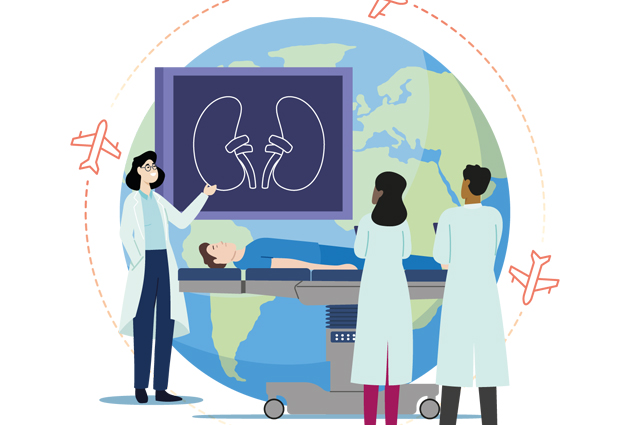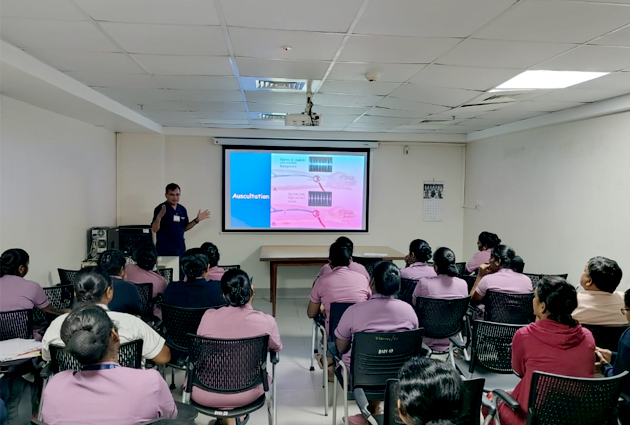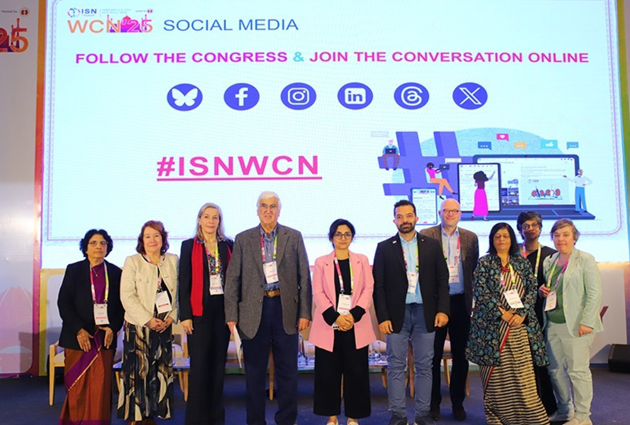Young ISN members manage COVID-19 Across the Globe
Healthcare workers at the main entrance to Hospital Obrero #2, Cochabamba, Bolivia
Young ISN members have been at the forefront of the global fight against COVID-19. In this article, Marina Wainstein, Rolando Claure-Del Granado, and Chimota Phiri share their experience of managing COVID-19 patients in Australia, Bolivia, and Malawi respectively highlighting the challenges young nephrologists face.
Brisbane, Australia (Marina Wainstein)
As for most people around the world, I think few of us here could imagine the impact this outbreak would have, not just on our health system, but on the daily rhythm and comforts of our lives. Australia has, thus far, been spared from the large-scale infection and death rates seen in other places around the world. Nevertheless, we continue to be in a state of partial lockdown and our health structures and operations are only just contemplating a return to the traditional models of care. In our hospital, wards were geographically re-structured to minimize staff traffic and to accommodate a burden of COVID-infected patients that has yet to come. Our outpatient clinics changed almost completely to phone consultations, forcing us to audit and triage our lists to select only the very few that required in-person attention. I found this especially difficult working with a predominantly home dialysis and transition group of patients for whom close follow-up, planning, training, and importantly, reassurance and support are key. Despite these challenges, I have been overwhelmed by our patients’ gratitude and empathy and the dedication and steadfastness of our staff. As a pregnant clinician through these times, I have felt the protection and concern of my colleagues for my well-being and the enormous solidarity that exists among our medical community.
Cochabamba, Bolivia (Rolando Claure-Del Granado)
I think one of the most important aspects of the COVID-19 pandemic has been the psychological impact on nephrologists and other healthcare workers due to lack of organization and clear directives from health care authorities in terms of outpatient dialysis operations, the organization of a referral center for COVID-19 positive patients, the lack of PPE, and false information (unreliable sources from social media). All of these issues have caused them to feel anxious and distressed. The workload has dramatically increased especially for young nephrologists and fellows, and some of them have started to show early signs of burnout. This is partly because the Bolivian Minister of Health has withdrawn personnel over 60 years old from hospitals and health care centers if they have chronic diseases such as diabetes and hypertension, and any pregnant personnel. This has had a significant impact on the physicians and other health care workers who remain working at hospitals and health care centers in Bolivia.
We have to take practical steps to prepare our nephrologists, fellows, and nurses to give the best care possible for patients with kidney disease during the COVID-19 pandemic and to prevent transmission by giving them online lectures on COVID-19 and kidney disease, create infographics in Spanish of different practical issues like how to educate patients, and how to organize hemodialysis units.
Fortunately, so far we haven’t had any COVID-19 positive patients with ESKD on chronic dialysis; I think this could be explained in part by education campaigns – launched for patients and their families, social distancing, and the early lockdown established by the national government just 2 weeks after the first 2 cases of COVID-19 were reported.
Blantyre, Malawi (Chimota Phiri)
Malawi has not been spared from the COVID-19 pandemic. So far we have recorded 33 confirmed cases with 3 deaths, but the actual number of infections may be underestimated as testing is not happening on a large scale. As a response to COVID-19, most of the clinics have been scaled down including general nephrology and hypertension clinics but patients on immunosuppression will be seen as per schedule.
With the government issuing restrictions on public gatherings and transport, the public transport fee has gone up rendering it difficult for health workers and patients to get to and from the hospital. Recently, government health workers went on strike to demand availability of personal protective equipment (PPE) and help to mitigate rising transport costs. This had an impact on patients with kidney disease who could not be properly cared for in the ward or access renal services appropriately. Luckily, this has been sorted out swiftly by the government and now services have returned to normal.
As all the patients attending chronic hemodialysis come from the community, we have trained our dialysis team to screen patients when they access the service as there is community transmission already of COVID-19. The challenge that we have now is dialysis of COVID-19 patients (either those on chronic hemodialysis or those who develop acute kidney injury as a complication of COVID19). Ideally, we should have a portable dialysis machine that could be moved around for patients in isolation who may benefit from dialysis.
Malawi is a landlocked country and is dependent on supplies being transported from other countries, like South Africa. Hence, lockdown measures and limitations on movement might negatively impact dialysis supplies. We are uncertain of how long the lockdown measures in neighboring countries will last so that we can replenish our supplies.












